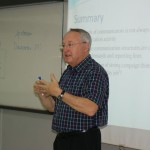 Last week, 35 advertising, marketing and public relations undergraduates presented their dissertation research at the Promotional Communications Annual Conference at the Executive Business Centre.
Last week, 35 advertising, marketing and public relations undergraduates presented their dissertation research at the Promotional Communications Annual Conference at the Executive Business Centre.
The event, held 15 May, was part of a Fusion bid by The Media School’s Dr Dan Jackson, Dr Richard Scullion, Dr Carrie Hodges, and Dr Janice Denegri-Knott to expand the conference and open a journal. This is the third year for the conference run by the Corporate and Marketing Communications (CMC) group within The Media School, and with the Fusion funding the organisers were able to expand the conference to include additional students and guests.
“The CMC Student Conference was a terrific success; the presentations were extremely professional, student engagement was very high and the commitment shown by the staff was exceptional,” said Colin Merrett, associate dean for the academic group. He called it “one of the highlights of the year” for CMC.
Industry guests who attended the event echoed the sentiment, calling the work of students ‘thought provoking’ and ‘challenging’. In total some 80 students, academic staff, alumni, and industry professionals attended the conference, which offers students an opportunity to share their dissertation research and for the academic group to showcase research-led teaching.
CMC students can choose to write a traditional dissertation of 10,000 words or write a research paper in the style of an 8,000-word journal article and deliver a 20-minute paper at the student conference. The 35 students who presented at the conference make up 17 per cent of the dissertation students on the three degree programmes. That’s the highest proportion of student take-up of this option for the dissertation.
“The quality of what I have seen in these dissertations is some of the best I have seen,” said Dr Heather Savigny, who joined BU at the start of the academic year.
The research that students presented ranged from asking questions about how second-generation African immigrant women negotiate culture and identity through hair care rituals to the impacts to pub and restaurant brands as a result of negative word-of-mouth online to whether advertising today represents a return of a sexist visual culture.
“I thought the best papers could have claimed space in some international conferences,” said Prof Barry Richards of CMC.
Now, the team turns its attention to the inaugural issue of The Journal of Promotional Communication. Once the dissertations are marked, the team will shortlist the top research papers and begin the (by all accounts based on the presentations from last week) arduous task of choosing seven papers to appear in the journal.
After the first edition is published, the journal will begin accepting submissions from undergraduates and postgraduates from BU and beyond. The journal represents a variety of disciplines, such as marketing, advertising, PR theory, consumer culture and behaviour, political communications, media studies, sociology, cultural studies, and management.
 Fusion supports new PR research collaboration in Asia
Fusion supports new PR research collaboration in Asia FMC-CMC’s Journal of Promotional of Communications Publishes New Volume
FMC-CMC’s Journal of Promotional of Communications Publishes New Volume










 Dr. Ashraf cited on ‘Modest Fashion’ in The Guardian
Dr. Ashraf cited on ‘Modest Fashion’ in The Guardian NIHR-funded research launches website
NIHR-funded research launches website Academics write for newspaper in Nepal
Academics write for newspaper in Nepal New paper published on disability in women & girls
New paper published on disability in women & girls Global Consortium for Public Health Research 2025
Global Consortium for Public Health Research 2025 MSCA Postdoctoral Fellowships 2025 Call
MSCA Postdoctoral Fellowships 2025 Call ERC Advanced Grant 2025 Webinar
ERC Advanced Grant 2025 Webinar Horizon Europe Work Programme 2025 Published
Horizon Europe Work Programme 2025 Published Horizon Europe 2025 Work Programme pre-Published
Horizon Europe 2025 Work Programme pre-Published Update on UKRO services
Update on UKRO services European research project exploring use of ‘virtual twins’ to better manage metabolic associated fatty liver disease
European research project exploring use of ‘virtual twins’ to better manage metabolic associated fatty liver disease